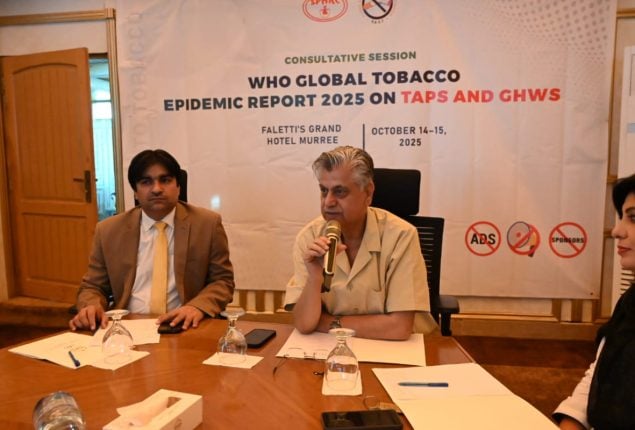
Murtaza Solangi Calls for Comprehensive Ban on TAPS and Stronger Enforcement of Health Warnings
Islamabad, October 15, 2025: The Society for the Protection of the Rights of the Child (SPARC) organized a two-day consultative session titled “WHO Global Tobacco Epidemic Report 2025 and Best Practices on Tobacco Advertisement, Promotion and Sponsorship (TAPS) and Graphic Health Warnings (GHWs)” to review Pakistan’s progress in implementing the WHO Framework Convention on Tobacco Control (FCTC) and its MPOWER components.
Addressing the participants as Chief Guest, Mr. Murtaza Solangi, Spokesperson to the President of Pakistan, said, “The latest WHO Global Tobacco Epidemic Report delivers a message that is both stark and urgent: tobacco continues to kill, and if we do not intensify our efforts particularly through bold actions like banning tobacco advertising, promotion, and sponsorship (TAPS) and increasing the size of graphic health warnings (GHWs) we will continue to lose lives that could otherwise be saved.” He highlighted that globally, tobacco kills more than 8 million people every year a figure greater than the combined deaths caused by HIV, tuberculosis, and malaria.
Mr. Solangi added that Pakistan faces a similarly alarming situation, with an estimated 27 million tobacco users and over 166,000 deaths annually due to tobacco related diseases. He further added that the consequences of tobacco use extend far beyond public health, burdening the economy, reducing productivity, and causing emotional and financial distress to families. Commending the decline in tobacco use across South Asia where consumption has dropped from 70% to 37% he called this an encouraging sign of progress. He expressed confidence that Pakistan could achieve similar success through sustained public awareness, stronger education campaigns, and the adoption of global best practices.
Former Member of the National Assembly, Dr. Nisar Ahmed Cheema, while commenting on the WHO report, emphasized that beyond alarming statistics lies a deeper concern the increasing appeal of tobacco products among youth. He noted that young people are often exposed to indirect promotional strategies such as attractive packaging, event sponsorships, and online content that can make tobacco appear less harmful or even appealing. Dr. Cheema stressed that despite existing regulations, forms of Tobacco Advertising, Promotion, and Sponsorship (TAPS) remain visible and must be comprehensively addressed. He urged stronger enforcement of large, image based Graphic Health Warnings (GHWs) and called for closing policy loopholes through robust legislation and public awareness.
Dr. Khalil Ahmad Dogar, Program Manager at SPARC, highlighted that promotional activities continue to influence consumer behavior in subtle ways despite current restrictions. Citing WHO findings, he said that countries enforcing complete bans on all forms of TAPS have seen significant declines in tobacco consumption, particularly among youth. Dr. Khalil emphasized that while Pakistan has made progress in tobacco control, further action is needed to remove existing gaps and ensure consistent enforcement. “The time has come for a total ban on all direct and indirect promotional means,” he said. He also underscored that strong, regularly updated graphic health warnings are proven, life-saving interventions that encourage smokers to quit and discourage initiation among non-smokers.
Faisal Zahid Malik, Chairman and Editor-in-Chief of Pakistan Observer, highlighted the critical role of media in advancing public health. “At Pakistan Observer, we consider it our duty to use our platform to raise awareness, encourage quitting, and hold all relevant stakeholders accountable for ensuring effective implementation of tobacco control measures,” he stated. He urged the media to rise above commercial pressures and align with the values of health, truth, and integrity. “We must choose to protect people over promoting profit,” he added.
Mr. Malik concluded by emphasizing the importance of collective action. “This is a fight that we can win but only if we act together, boldly, and decisively. Government, civil society, media, health professionals, educators, parents, and youth all have a role to play. Let us work towards a tobacco-free generation, stronger enforcement systems, and a healthier society.”
The session brought together key stakeholders, including decision makers, government officials, journalists, civil society members, academics, media professionals, and youth organizations. Participants reviewed Pakistan’s progress on implementing Graphic Health Warnings (GHWs) and enforcing Tobacco Advertising, Promotion, and Sponsorship (TAPS) regulations, emphasizing the need for stronger enforcement and coordinated action to accelerate tobacco control efforts.
Read More News On
Catch all the Pakistan News, Breaking News Event and Latest News Updates on The BOL News
Download The BOL News App to get the Daily News Update & Follow us on Google News.




